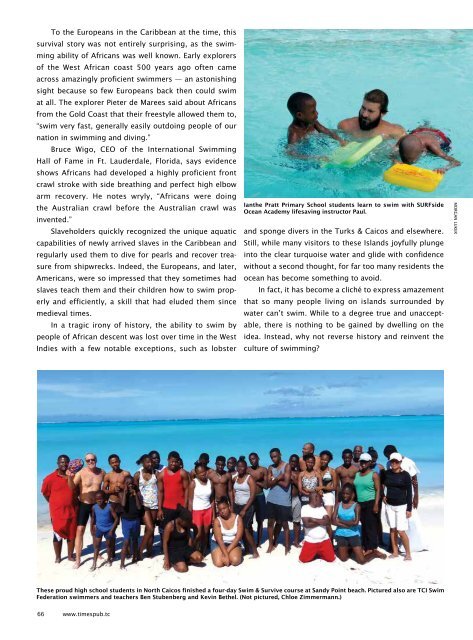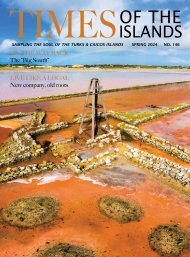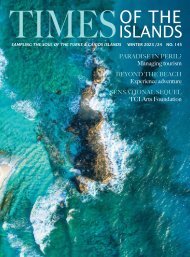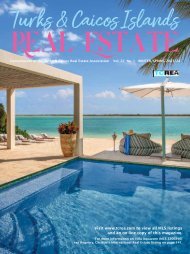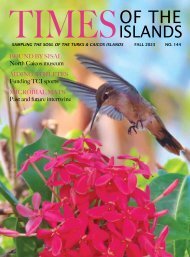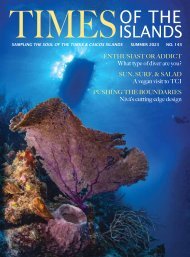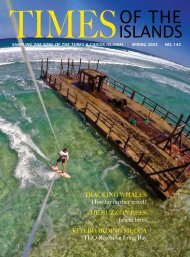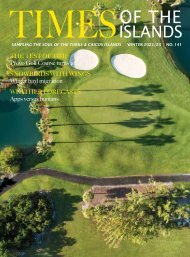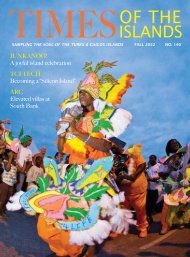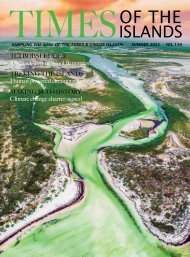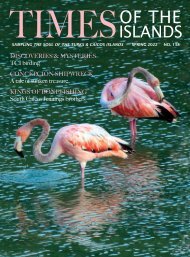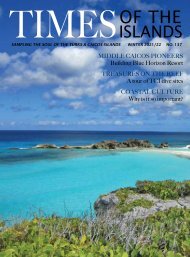Times of the Islands Summer 2016
Presents the "soul of the Turks & Caicos Islands" with in-depth features about local people, culture, history, environment, businesses, resorts, restaurants and activities.
Presents the "soul of the Turks & Caicos Islands" with in-depth features about local people, culture, history, environment, businesses, resorts, restaurants and activities.
Create successful ePaper yourself
Turn your PDF publications into a flip-book with our unique Google optimized e-Paper software.
To <strong>the</strong> Europeans in <strong>the</strong> Caribbean at <strong>the</strong> time, this<br />
survival story was not entirely surprising, as <strong>the</strong> swimming<br />
ability <strong>of</strong> Africans was well known. Early explorers<br />
<strong>of</strong> <strong>the</strong> West African coast 500 years ago <strong>of</strong>ten came<br />
across amazingly pr<strong>of</strong>icient swimmers — an astonishing<br />
sight because so few Europeans back <strong>the</strong>n could swim<br />
at all. The explorer Pieter de Marees said about Africans<br />
from <strong>the</strong> Gold Coast that <strong>the</strong>ir freestyle allowed <strong>the</strong>m to,<br />
“swim very fast, generally easily outdoing people <strong>of</strong> our<br />
nation in swimming and diving.”<br />
Bruce Wigo, CEO <strong>of</strong> <strong>the</strong> International Swimming<br />
Hall <strong>of</strong> Fame in Ft. Lauderdale, Florida, says evidence<br />
shows Africans had developed a highly pr<strong>of</strong>icient front<br />
crawl stroke with side breathing and perfect high elbow<br />
arm recovery. He notes wryly, “Africans were doing<br />
<strong>the</strong> Australian crawl before <strong>the</strong> Australian crawl was<br />
invented.”<br />
Slaveholders quickly recognized <strong>the</strong> unique aquatic<br />
capabilities <strong>of</strong> newly arrived slaves in <strong>the</strong> Caribbean and<br />
regularly used <strong>the</strong>m to dive for pearls and recover treasure<br />
from shipwrecks. Indeed, <strong>the</strong> Europeans, and later,<br />
Americans, were so impressed that <strong>the</strong>y sometimes had<br />
slaves teach <strong>the</strong>m and <strong>the</strong>ir children how to swim properly<br />
and efficiently, a skill that had eluded <strong>the</strong>m since<br />
medieval times.<br />
In a tragic irony <strong>of</strong> history, <strong>the</strong> ability to swim by<br />
people <strong>of</strong> African descent was lost over time in <strong>the</strong> West<br />
Indies with a few notable exceptions, such as lobster<br />
Ian<strong>the</strong> Pratt Primary School students learn to swim with SURFside<br />
Ocean Academy lifesaving instructor Paul.<br />
and sponge divers in <strong>the</strong> Turks & Caicos and elsewhere.<br />
Still, while many visitors to <strong>the</strong>se <strong>Islands</strong> joyfully plunge<br />
into <strong>the</strong> clear turquoise water and glide with confidence<br />
without a second thought, for far too many residents <strong>the</strong><br />
ocean has become something to avoid.<br />
In fact, it has become a cliché to express amazement<br />
that so many people living on islands surrounded by<br />
water can’t swim. While to a degree true and unacceptable,<br />
<strong>the</strong>re is nothing to be gained by dwelling on <strong>the</strong><br />
idea. Instead, why not reverse history and reinvent <strong>the</strong><br />
culture <strong>of</strong> swimming?<br />
MORGAN LUKER<br />
These proud high school students in North Caicos finished a four-day Swim & Survive course at Sandy Point beach. Pictured also are TCI Swim<br />
Federation swimmers and teachers Ben Stubenberg and Kevin Be<strong>the</strong>l. (Not pictured, Chloe Zimmermann.)<br />
66 www.timespub.tc


